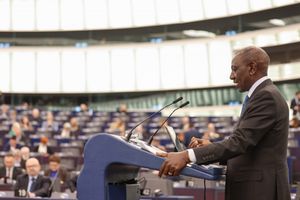Taylor deported to Liberia

Former Liberian President Charles Taylor

Former Liberian President Charles Taylor
Nigeria captured fugitive former Liberian President Charles Taylor on the border with Cameroon today and deported him to Liberia, easing its embarrassment at his escape earlier in the week.
The dramatic arrest and deportation came hours before President Olusegun Obasanjo was due to meet US President George W. Bush, who has been pushing for Mr Taylor to face war crimes charges in a special UN-backed court for years.
"President Obasanjo has ordered the immediate repatriation of Charles Taylor to Liberia ... to help the government of Liberia which had requested custody of the former president," Nigerian Information Minister Frank Nweke said in a statement.
Journalists saw Mr Taylor, dressed in a white safari suit and surrounded by about 20 soldiers, walk onto the tarmac at Maiduguri airport, in Nigeria’s far northeast, and board a Nigerian presidential jet.
"We have instructions to transport him directly to Monrovia," a security official at the airport said, asking not to be named.
UN peackeepers at Monrovia’s Roberts International Airport prepared to arrest him and send him for trial at the court in Sierra Leone.
The 58-year-old former warlord was seized at dawn at the border more than 1,500 kilometres from Calabar, where he had been living in exile since 2003 until his disappearance on Monday night.
Mr Taylor was travelling in a jeep with diplomatic plates with a woman and boy, and a large amount of money in dollars in a trunk, local officials said.
Nigeria and Liberia have been at odds over how to handle the case since Liberia’s newly-elected president asked for him to be handed over in early March.
Mr Taylor went into exile as part of a deal to end 14 years of civil war in Liberia that spilled over into nearby states.
In Sierra Leone, he is accused of supporting rebels notorious for hacking off the limbs of civilians in exchange for diamonds to finance the Liberian conflict. An estimated 300,000 died in the wars that spawned a generation of child soldiers.
Nigeria had resisted sending Mr Taylor to Sierra Leone, arguing that the terms of his asylum stated that he could only be returned to Liberia.
Some fear that Mr Taylor’s presence in Liberia could spark renewed bloodshed in the region as it recovers from the devastating conflict.
International outcry
Mr Taylor’s disappearance from his residence on Monday caused an international outcry. Some US congressmen urged President Bush to cancel today’s meeting with President Obasanjo.
Mr Nweke’s statement said the meeting was going ahead and the two presidents would discuss the matter of Mr Taylor’s disappearance from Calabar.
Mr Nweke said President Obasanjo and President Bush would also discuss bilateral issues and matters of security, conflict resolution and developments in Africa.
The United States has major oil interests in Nigeria, its fifth biggest supplier of crude.
Late today in Washington, President Bush said that he appreciates the government of Nigeria’s work to apprehend Mr Taylor.
"The fact that Charles Taylor will be brought to justice in a court of law will help Liberia and is a signal, Mr President, of your deep desire for there to be peace in your neighbourhood,'' Mr Bush told Mr Obasanjo in an Oval Office meeting.
The West African leader said he rejected claims that Nigerian authorities may have been complicit in the escape on Tuesday of Mr Taylor.
"I do not agree, must disagree that we have been negligent in the way we handled the Charles Taylor issue,'' President Obasanjo said.
In 2003, President Obasanjo cut a deal that allowed Mr Taylor to settle in Nigeria. Recently, he agreed to a request by Liberia’s new president, Ellen Johnson Sirleaf, to surrender Mr Taylor for trial at the international criminal tribunal in Sierra Leone.
"If we had been negligent, then Charles Taylor would have got away,'' President Obasanjo said in his defense. "He would not have been arrested if there was negligence.''
President Bush said the two leaders also talked about Darfur and the Sudan, and an international response in helping end a 21-year civil war. The UN Security Council voted last week to keep UN peacekeepers in Sudan to monitor an accord ending the civil war and authorized planning for the expected extension of the UN force’s operations to Darfur.
"I made it very clear to him (Obasanjo) that we are deeply concerned about the humiliation, the rape, the murder that is taking place among the – against the citizens of Darfur. He agreed,'' President Bush said.
President Bush said he has made it clear to the Sudanese government that there will be an international response in working toward peace.




